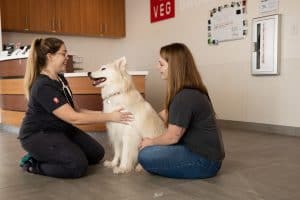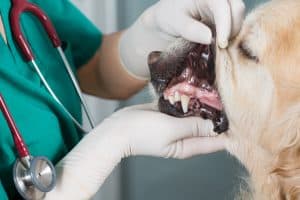
Dog Dental Emergencies – Signs and Symptoms
WRITTEN BY DR. SAVANNA GEPHARD - SHARED FROM OUR TRUSTED FRIENDS AT VETERINARY EMERGENCY GROUP
Is your dog experiencing a dental emergency, or do you think she might be? How do you know if your dog is going through a crisis when it comes to her dental health? What should you do about this type of situation?
As a dog owner, you know how important your pet’s dental health can be. However, you may not realize how to recognize the signs and symptoms of a dental emergency in your dog. In the article below, we’ll walk you through a list of some of the most common signs and symptoms of dog dental emergencies, so you can tell when your pet may need to see a vet.
SYMPTOMS OF DOG DENTAL EMERGENCIES
The most common symptoms are listed below:
SWELLING
Swelling is one of the first indicators of canine dental emergencies that many pet owners notice when something goes wrong. Swelling may occur at the site of the problem, but it can also occur anywhere in and around your dog’s mouth, face, and neck. If your dog has unexplained swelling anywhere on her head, a dental emergency could be the cause.

Swelling is often accompanied with pain, which further indicates a problem. If you notice swelling you can’t explain, go to the vet as soon as possible. And if the swelling is in your dog’s snout or neck instead of her mouth, go to the emergency vet, as this may also be a sign of anaphylaxis.
SIGNIFICANT BLEEDING
Significant bleeding from the mouth typically indicates a dental emergency as well. Some slight bleeding may occur from a variety of causes, including something as simple as a cut on the mouth or tongue from a favorite chew toy.
However, if your dog’s mouth is bleeding considerably, or if the bleeding worsens or does not stop, this means it’s time to see an emergency vet. Your dog could be experiencing a dental emergency that requires veterinary care to resolve.
TOOTH LOSS
As your dog ages, it is normal for her to lose a few teeth here and there. And of course, if she is a puppy, she will lose all of her baby teeth during the first several months of her life. But if your dog is an otherwise healthy adult and is losing teeth—or if she is any age and seems to be losing several teeth at once—this could mean she has a dental health problem that needs to be addressed.
Additionally, sudden tooth loss as a result of injury should be treated as a dental emergency. Go to the emergency vet if your dog is injured in such a way that she loses one or more teeth.
ABSCESS
An abscess in the mouth is a pocket of infection that usually occurs following a cut or other injury. This type of issue can become severe if the abscess pops or drains, and it may lead to a serious infection of the blood if left untreated.
If you notice an abscess in your dog’s mouth or you suspect this could be what’s going on, see an emergency vet right away. The sooner you have the abscess drained or removed professionally, the safer your dog will be.
DIFFICULTY OR UNWILLINGNESS TO EAT

Unwillingness to eat may indicate a variety of health problems in dogs. Difficulty eating, however, often means something is going on with your dog’s dental health. Either of these symptoms should be checked by a vet as soon as possible to find the underlying cause.
If your dog is having trouble eating due to her dental health, your vet may recommend a surgical procedure to remove the affected teeth or treat any other issues. However, in some cases, your dog may not be a good candidate for dental surgery. In this situation, you should ask your vet about feeding your dog wet food moving forward.
AGGRESSION OR DEFENSE
Finally, if your dog seems to be more aggressive or defensive than is normal for her, this means she may be in pain. If the aggression or defensive behavior occurs most commonly when you try to pet her face or snout, this may mean the pain is coming from her mouth.
Take your dog to her regular vet to figure out what’s causing her pain. If she has any other, more severe symptoms, go to the emergency vet instead of waiting to get an appointment with your pet’s regular veterinarian.
SEEK VETERINARY CARE FOR DOG DENTAL EMERGENCIES 
This list does not cover all the symptoms of dental emergencies in dogs. However, it can help you get started learning more, and it can make your dog’s dental health easier for you to monitor, too.
Keep up with regular dental cleanings by a veterinary professional to ensure your dog does not experience any dental emergencies. If possible, brush her teeth once or twice a month, and be sure to give her dental health chew treats periodically as well.
For additional information on dog dental emergencies, contact VEG by calling one of their locations. VEG has locations across the country, many of which are open 24/7, and all of them are open 24 hours on the weekends and on holidays. The VEG team cares about your dog’s wellbeing as much as you do, which is why when time is truly of the essence, they’re always there for you and your pet when you need them most.
 from Savanna Gephard
from Savanna Gephard



